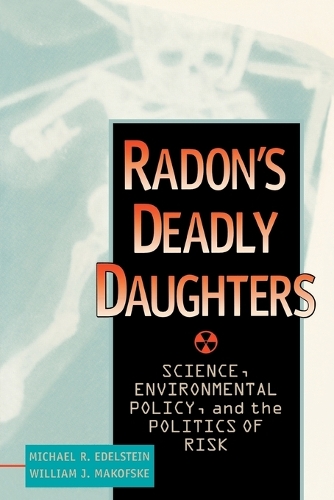
Radon's Deadly Daughters: Science, Environmental Policy, and the Politics of Risk
(Paperback)
Publishing Details
Radon's Deadly Daughters: Science, Environmental Policy, and the Politics of Risk
By (Author) Michael R. Edelstein
By (author) William J. Makofske
Bloomsbury Publishing PLC
Rowman & Littlefield Publishers
18th December 1997
United States
Classifications
Tertiary Education
Non Fiction
363.7384
Physical Properties
Paperback
380
Width 149mm, Height 227mm, Spine 21mm
513g
Description
Five years after Three Mile Island awakened Americans to the dread of radioactive release, a new and potentially more consequential radioactive threat was discovered in a Pennsylvania home. Touted as the second major cause of lung cancer, the radon problem was prominent as a leading environmental risk. However, widespread acceptance of this risk has never materialized. In this vibrant account, Edelstein and Makofske unveil the complex mix of social and scientific factors that have led to public and official misunderstanding of the geologic radon issue. The lessons of radon have great relevance in a contaminated world where people are increasingly surrounded by invisible environmental hazards, where uncertainty and controversy shroud a clear understanding of the threat, and where one can choose apathetic acceptance or attempt to discern how to actively protect oneself and one's family.
Reviews
As its subtitle promises, this is a book on radon policy, not radon psychology. Yet in another sense Radon's Deadly Daughters is very much a book about health psychology. How radon came to be framed as it did, and how the way it was framed affected policy and thus public health, are essentially questions of health psychology, questions that Edelstein and Makofske address with authority and insight. * Journal Of Health Psychology *
The authors provide a persuasive, well-written case study in which radon policy is seen as a model of a failing, decentralized, free market approach to environmental hazards. The book provides a succesful weave of science, policy, and culture. This is a thought provoking book for those interested in understanding radon or risk assessment and for environmental planning faculty looking for a well written, comprehensive case study. * Journal of the American Planning Association *
Author Bio
Michael R. Edelstein is professor of environmental psychology at Ramapo College in New Jersey and the author of Contaminated Communities. William J. Makofske is professor of environmental physics at Ramapo College and the author of Technology and Global Environmental Issues. Both previously collaborated on Radon and the Environment.
